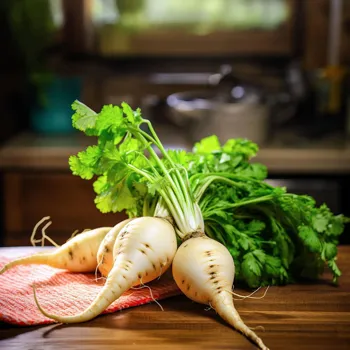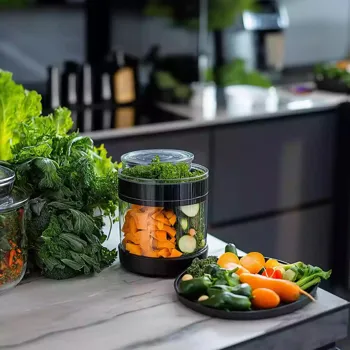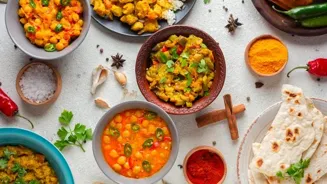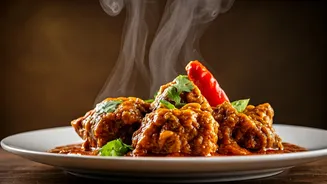Discover how to make your Indian cooking sustainable! Explore 10 tips to reduce your environmental impact deliciously
Indian cuisine, a beautiful tapestry woven with diverse spices, vibrant vegetables,
and age-old traditions, holds a special place in our hearts and on our plates. But, like any culinary practice, it can contribute to environmental concerns if not approached mindfully.
Sustainability isn't just a buzzword; it's a crucial shift towards responsible living, ensuring that we can relish our delicious food without compromising the planet for future generations.
So, let's explore ten simple yet impactful ways to make your Indian cooking rituals more eco-friendly, one delectable dish at a time.
Embrace the Power of Local & Seasonal
The cornerstone of sustainable cooking lies in choosing ingredients that are grown locally and are in season. Think about it - transporting food across long distances leaves a significant carbon footprint, and out-of-season produce often requires excessive energy and resources to cultivate.

Instead, visit your local farmers' markets or even better, source directly from farmers. Chat with them, learn about their practices, and relish the freshness and flavour of seasonal vegetables and fruits.
Not only will your dishes taste better, but you’ll also be supporting your local economy and reducing your environmental impact considerably. Plan your meals around what's available locally each season.
This automatically encourages variety in your diet and exposes you to a wider range of nutrients, all while minimizing your carbon footprint. Opt for veggies like spinach, fenugreek (methi), mustard greens (sarson) in the winter, and gourds (like bottle gourd, ridge gourd) and okra in the summer.
Reduce Food Waste Like a Pro
Food waste is a major global issue, and our kitchens are often a significant contributor. Plan your meals carefully, buy only what you need, and get creative with leftovers. Indian cuisine offers a plethora of ways to transform leftover rotis, rice, and vegetables into delicious new dishes.
Think roti upma, vegetable cutlets, or even a simple but flavourful rice porridge. Store your food properly to prolong its shelf life – airtight containers are your best friends. Compost vegetable scraps to enrich your garden soil, reducing the amount of waste sent to landfills.
By minimizing food waste, you're not just saving money; you're also conserving the resources (water, energy, land) that went into producing that food.
Go Green with Your Groceries
Say goodbye to single-use plastic bags and embrace reusable shopping bags made from cloth or jute. Carry your own produce bags for fruits and vegetables. When buying groceries, opt for products with minimal packaging and choose items packaged in recyclable materials like glass or paper.

Consider bulk buying for dry goods like lentils, rice, and spices to reduce packaging waste. Every small step counts, and consistently choosing eco-friendly packaging options sends a strong message to producers to prioritize sustainability.
Spice it Up Sustainably
Spices are the heart and soul of Indian cooking, but conventional spice farming can sometimes involve unsustainable practices like pesticide use. Look for organic and Fair Trade certified spices.
This ensures that the spices have been grown using environmentally friendly methods and that the farmers have been paid a fair price for their produce. You can also grow your own herbs and spices in your balcony or garden.
Imagine the joy of plucking fresh basil or mint leaves straight from your plant to garnish your dishes!
Cook Smartly, Save Energy
Cooking consumes energy, but you can minimize your energy usage with a few simple techniques. Use pressure cookers to cook dal and rice – they significantly reduce cooking time and energy consumption. Cover your pots while cooking to trap heat and reduce cooking time.
Use appropriately sized cookware for the amount of food you're cooking – a large burner under a small pot wastes energy. Embrace solar cooking whenever possible. There are many solar cooker designs available today, allowing you to cook simple dishes using the power of the sun.
Embrace Traditional Cooking Methods
Our grandmothers and great-grandmothers were masters of sustainable cooking. They used earthen pots, which cook food slowly and evenly, preserving its nutrients. They relied on sun-drying for preserving vegetables and fruits. They maximized the use of every ingredient, minimizing waste.
Embrace these traditional methods to reduce your reliance on modern appliances and rediscover the wisdom of sustainable cooking.
Water-Wise Cooking
Water is a precious resource, so be mindful of your water usage in the kitchen. Wash vegetables in a bowl instead of under a running tap. Use the water you've used to wash rice or pulses to water your plants. Harvest rainwater to use for cooking and cleaning.
By practicing water conservation, you are contributing to the preservation of our water resources.
Choose Sustainable Utensils
Opt for eco-friendly cookware and utensils made from sustainable materials like bamboo, wood, or stainless steel. Avoid non-stick cookware that may contain harmful chemicals. Use wooden spatulas and spoons instead of plastic ones.

These small choices can make a big difference in reducing your environmental impact.
Composting is Key
Don’t throw away those vegetable peels, fruit rinds, and coffee grounds! Invest in a compost bin or start a compost pile in your backyard. Composting turns kitchen waste into nutrient-rich soil that you can use to enrich your garden.
It's a fantastic way to reduce landfill waste and create a valuable resource for your plants.
Spread the Word & Inspire Others
Sustainability is a collective effort. Share your knowledge and tips with friends, family, and neighbours. Inspire them to adopt sustainable cooking practices. Organize cooking workshops to teach others about sustainable ingredients and cooking methods.
Together, we can create a more sustainable food system for future generations.
Indian cooking tips for eco-friendly meals, sustainable future
By incorporating these ten simple strategies into your Indian cooking routine, you can significantly reduce your environmental impact and contribute to a more sustainable future. Remember, every small step counts, and together, we can make a big difference.
So, let's continue to savor the deliciousness of Indian cuisine while ensuring a healthy planet for generations to come. Happy (and sustainable) cooking!















